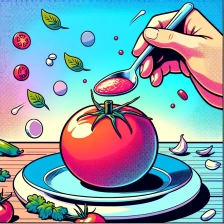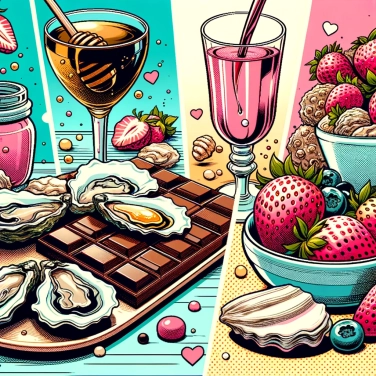In detail, for those interested!
Aphrodisiac power of food: Myth or reality?
The aphrodisiac properties attributed to certain foods date back to antiquity and still persist today. However, the question of whether these effects are real or simply the result of popular beliefs remains a subject of debate among specialists. Some argue that there is no strong scientific evidence to support the idea that certain foods have a real aphrodisiac power. Others, on the other hand, rely on historical studies and empirical observations to defend the effectiveness of these foods on libido.
It is important to note that the aphrodisiac effects of foods can vary from person to person, and that psychological and cultural factors may also play a role in the perception of these effects. Ultimately, the question of whether the aphrodisiac power of foods is a myth or a reality remains open and continues to fuel scientific and cultural debates on this topic.
Foods and their components that promote libido.
Foods and some of their components can promote libido due to their influence on the functioning of the hormonal and nervous systems. Some foods rich in certain vitamins and minerals, such as zinc, magnesium, and B vitamins, are associated with better sexual function. Zinc, for example, is essential for testosterone production, a key hormone in regulating sexual desire in both men and women. Oysters, pumpkin seeds, almonds, and spinach are zinc-rich foods that can help boost libido.
Omega-3 fatty acids found in fatty fish like salmon and sardines can also promote blood circulation, which is essential for healthy sexual function. Antioxidants found in fruits and vegetables, such as berries, citrus fruits, tomatoes, and carrots, are known to protect cells against oxidative damage and can help maintain the health of sexual organs.
Some foods like dark chocolate, chili peppers, ginger, and ginseng are also known for their ability to stimulate libido due to their stimulating effects on the body. Dark chocolate, for example, contains compounds that can increase the production of endorphins, the "happiness hormones," which can promote a sense of well-being and sexual desire. Chili peppers, ginger, and ginseng have vasodilator properties that can improve blood circulation and increase the sensitivity of erogenous zones.
In summary, certain foods rich in zinc, omega-3 fatty acids, antioxidants, and stimulating compounds can contribute to promoting libido by acting on different aspects of the physiological and hormonal functioning of the body.
Link between certain foods and sexual satisfaction
Some foods can have an impact on sexual satisfaction and desire. For example, studies suggest that oysters could play a role due to their high zinc content, an essential mineral for testosterone production. Similarly, bananas contain potassium and vitamin B, which can help increase energy levels and libido. Red fruits such as strawberries and raspberries are rich in antioxidants, which promote blood circulation, an important aspect for healthy sexual function. Avocados, rich in healthy fats, can contribute to good cardiovascular health, which is linked to better sexual performance. Finally, dark chocolate is often considered an aphrodisiac food due to its ability to increase serotonin production, often called the happiness hormone, which can have a positive impact on mood and sexual desire.
Foods with stimulating properties: Is there a scientific explanation?
The stimulating effects of certain foods on libido have been attributed to several bioactive components present in these foods. For example, dark chocolate is often associated with aphrodisiac effects due to its high content of phenylethylamine, a compound that stimulates the release of endorphins in the brain, thus inducing feelings of well-being and pleasure. Additionally, chocolate also contains caffeine and theobromine, substances that can increase vitality and improve mood.
Some fruits like bananas are also known for their stimulating properties due to their high content of B vitamins, especially vitamin B6, which plays a crucial role in the production of neurotransmitters involved in mood and sexual desire regulation. Additionally, bananas contain potassium and bromelain, elements that can contribute to improved blood circulation, thus promoting better erectile function.
Oysters are another food often considered aphrodisiac due to their high zinc content, an essential mineral for the production of sex hormones such as testosterone. Zinc is also involved in the regulation of libido and sexual function. Moreover, oysters contain amino acids like tyrosine, which can stimulate the production of neurotransmitters involved in sexual response.
In summary, foods with stimulating properties can act on libido in different ways, by promoting the production of key neurotransmitters, improving blood circulation, or stimulating the production of sex hormones. These effects have a solid scientific basis, although individual reactions may vary depending on each individual's sensitivity.
Natural aphrodisiacs: What are the foods known for their effect on libido?
Some foods have acquired a reputation as aphrodisiacs due to their stimulating properties on libido. Among these, we find oysters, known for their high zinc content, an essential mineral for testosterone production. Bananas are also considered natural aphrodisiacs because of their content of vitamins B and potassium, contributing to energy and sex hormone production.
Avocados are often associated with sensuality due to their suggestive shape, but also because of their richness in folic acid, vitamin E, and potassium, beneficial for cardiovascular health and blood circulation, important factors for sexual performance. Almonds, rich in essential fatty acids, vitamin E, and magnesium, are also considered natural libido boosters.
Figs, because of their juicy and fleshy texture, are often associated with sensuality, but they are also rich in antioxidants, fiber, and minerals that promote blood circulation, which can contribute to a better sexual response. Finally, dark chocolate, because of its content of phenylethylamine and tryptophan, compounds that stimulate serotonin production and induce a sense of well-being, is often considered a natural aphrodisiac.
![Explain why some countries change time zones?]()
![Explain why Alexander the Great refused to wear shoes.]()
![Explain why Alexander the Great always wore an impressive helmet.]()
![Explain why the last Chinese emperor was so young when he came to power?]()





















